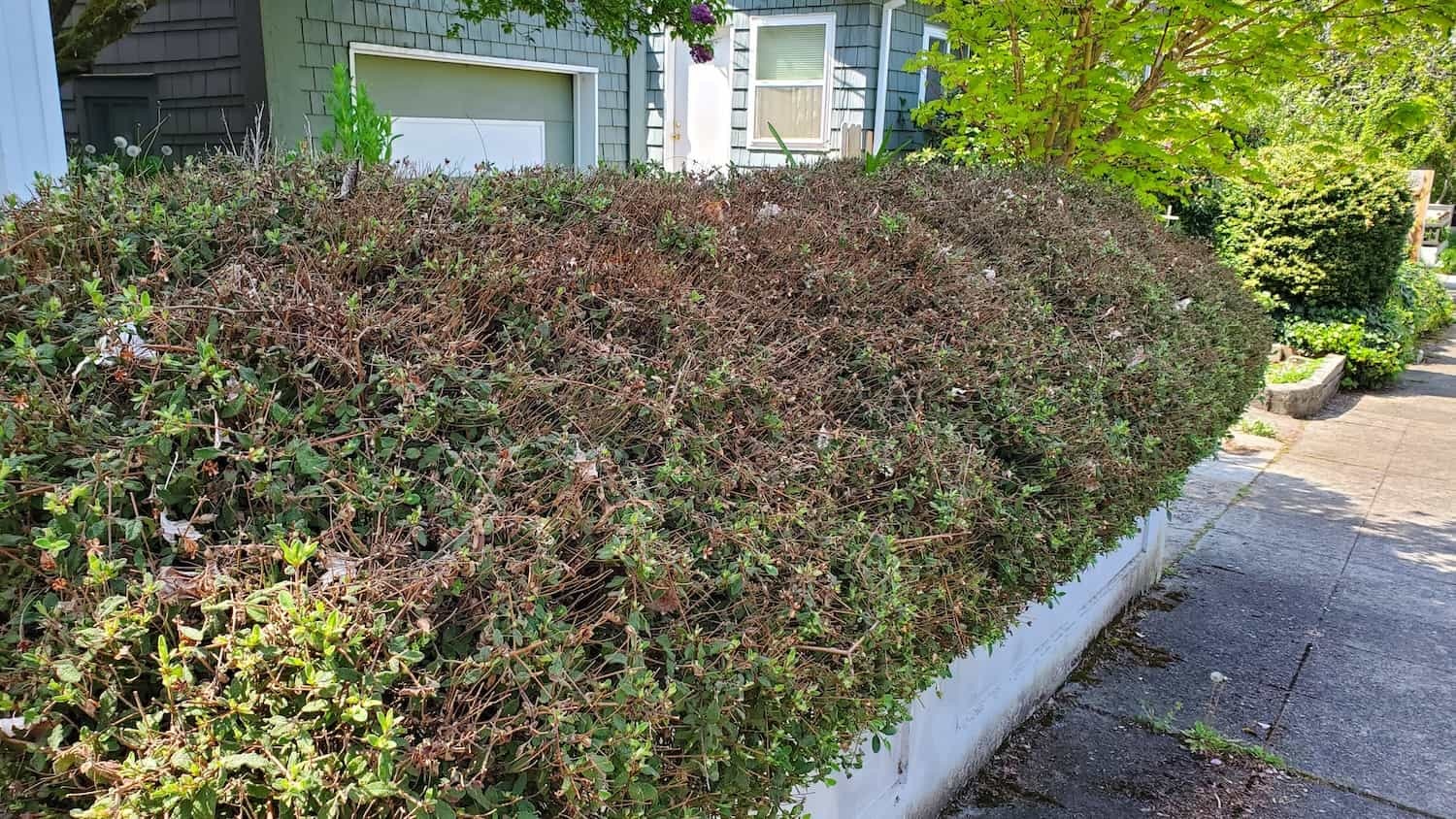West Seattle Ground ivy eradication
Homeowner’s Issue
Ground ivy (a.k.a. creeping Charlie) loves the conditions common on West Seattle lots — shade from cedars and Douglas-firs, compacted soil in older yards, and consistently damp winters. Between October and April we get most of our 35–40 inches of rain, so shallow-rooted weeds spread quickly in the cool, wet months. Many West Seattle slopes (Admiral, High Point side yards) funnel water into low patches where ground ivy outcompetes thin turf. Near Alki and Lincoln Park, salt spray and wind create exposed microclimates that stress turf and open niches for opportunistic weeds.
Most homeowners notice it first as a low, glossy green mat in shady lawn margins, under hedges, or along driveways — spots that stay damp and are mowed infrequently. Poor drainage, compacted clay pockets, and a lack of aggressive, shade-tolerant grass seed make long-term control harder. HOAs and curb appeal standards in parts of the Admiral and Morgan Junction areas mean repeated cosmetic treatments don’t work; you need durable cultural fixes: improved soil structure, targeted mechanical removal, smothering or reseeding with the right cool-season mixes, and simple drainage tweaks. Our approach respects West Seattle’s rainy season and prefers hands-on, sustainable methods rather than chemical quick-fixes.
Our Quality Service
We do practical, low-impact eradication and restoration using hand and mechanical methods suited to West Seattle yards. Typical steps:
- Inspect site and map damp pockets, shade, and compaction.
- Hand-pull and use root-ripping tools where practical; targeted turf-cutting for heavy mats.
- Smother persistent patches with cardboard and wood-mulch or solarize small areas where sun exposure allows.
- Improve soil with topdressing compost and aeration, then overseed with shade-tolerant fescue mixes.
- Adjust grade/drainage or add gravel trenches on slopes to reduce standing moisture.
Timelines: small jobs can be done in one visit; moderate infestations need 2–4 seasonal visits (spring removal, late-summer reseed, fall follow-up). We use hand tools, powered aerators, turf cutters, and compost — no herbicides. Benefits: safer for kids and pets, better long-term curb appeal, reduced repeat treatments, and stronger turf that outcompetes weeds.
What’s Included
- Full site assessment and photographed report.
- Manual removal and mechanical dethatching where needed.
- Smothering or solarization of stubborn patches.
- Compost topdressing, aeration, and overseeding with shade mixes.
- Edging and clean-up; green-bin or haul-away options.
Options / Upgrades:
- Mulch + cardboard smothering for beds.
- Heavy-duty turf cutter for large infestations.
- Soil testing and custom compost amendments.
- Haul-away vs. green-bin composting (we’ll discuss best local disposal).
Before & After / Expectations
- Expect some mess and hauling: removed mats, thatch, and soil move during the job.
- Noise: powered aerators and cutters are used only when needed, usually under 2 hours on-site.
- Access: keep gates clear; we need hose access for reseeding and compaction fines.
- Timelines: allow 2–8 weeks for visible improvement; full recovery and turf establishment can take a season.
- Care tips for West Seattle: overseed in late summer/early fall for best establishment before rains; raise mower height to 3–3.5” to shade soil; avoid wet-season irrigation; maintain 2–3” of organic mulch in beds to suppress re-invasion. Remove ivy and English ivy runners in spring before they set seed.
FAQs
Q: Will it come back?
A: If underlying conditions (poor drainage, shade, thin turf) remain, yes. Our plan targets those causes to reduce recurrence without chemicals.Q: Is this safe for kids and pets?
A: Yes. We use physical removal, mulch, compost, and overseeding — no herbicides.Q: When’s the best time to treat?
A: Late spring for removal and late summer/early fall for reseeding and establishment before winter rains.Q: Do you handle steep slopes?
A: Yes — we recommend erosion controls (jute matting, terraces) and different smothering techniques for steep West Seattle banks.
Call to Action
If ground ivy is taking over a shady patch near your home in West Seattle, Alki, or Lincoln Park, book a free estimate. We schedule quickly, show up with local know-how, and prefer fixes that last. Email neatandtidyseattle@gmail.com or call/text 206-538-9344 to get on the calendar. Licensed & insured, practiced on West Seattle slopes and shady yards — practical, sustainable results.










